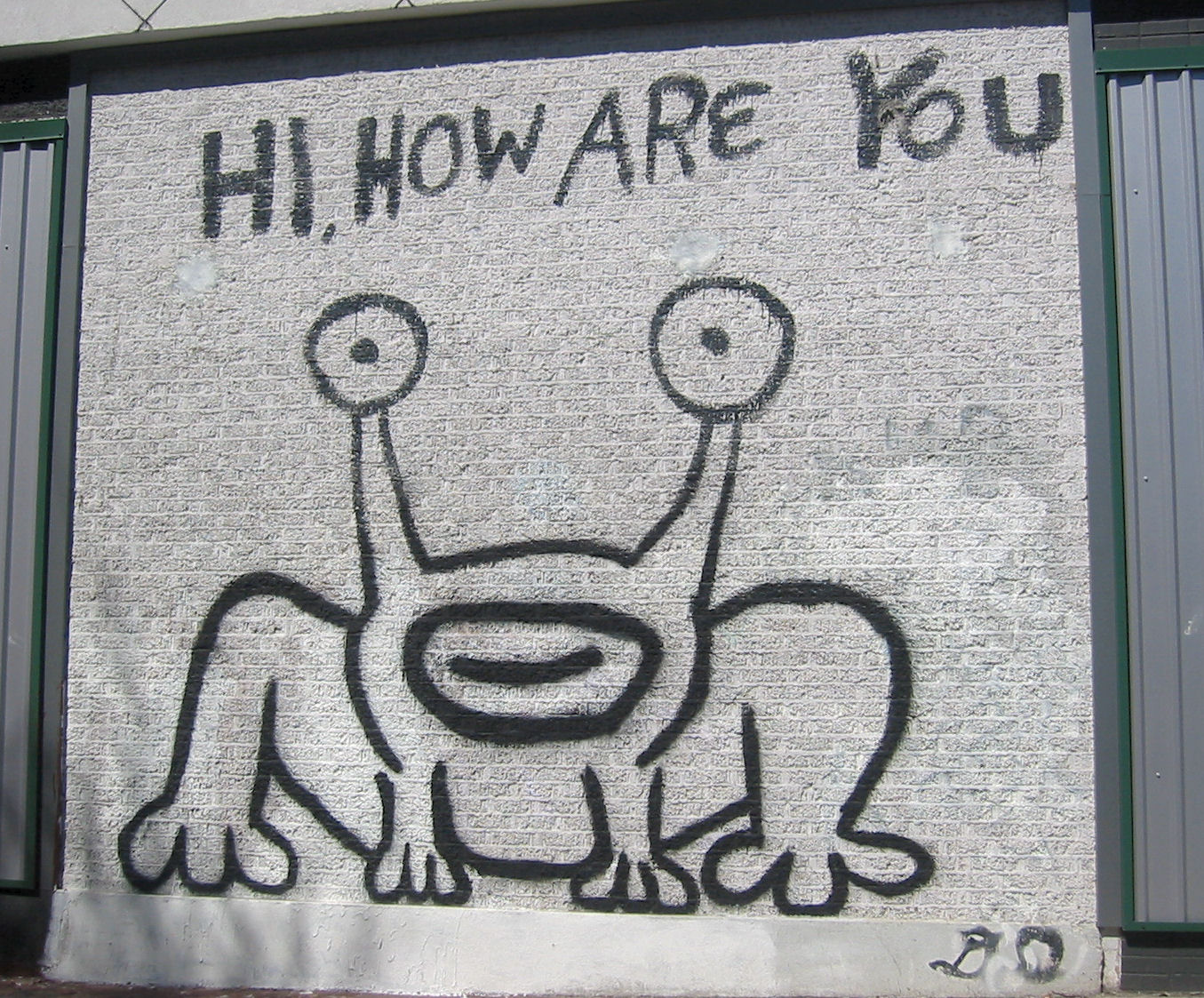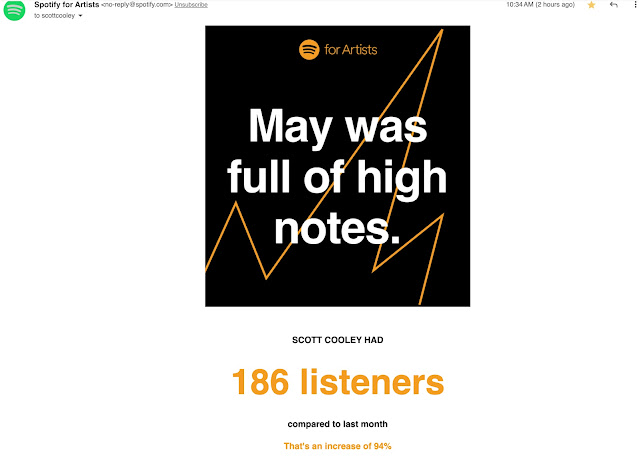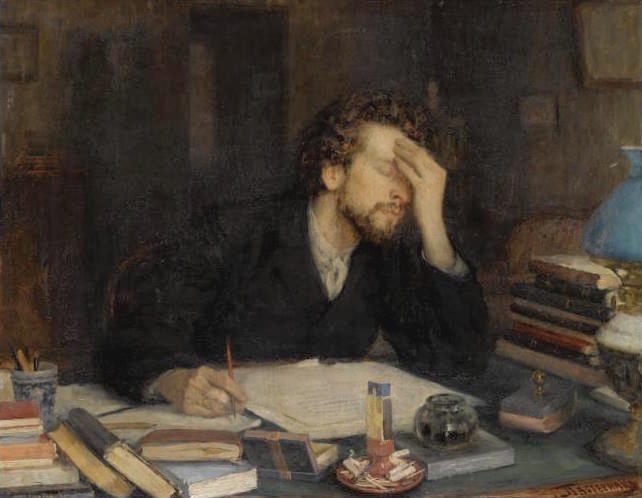Got Stealth Wealth? What is it, and do I have it?
Happy New Year! Welcome (or welcome back) to my blog where I talk about myself and my feelings - as a form of "engaging" with you, my audience, as it relates to me "posing" as a solo artist and songwriter. "They" say you're supposed to do that to get more true fans. Imagine me holding up air quotes as I overuse them please, like Chris Farley used to do. Feel free to comment, call, email, whatever. By the way, I'm now on this promising new social butterfly network called Bluesky, so feel free to engage there as well: https://bsky.app/profile/scottcooley.bsky.social
Feeling fortunate to have made it through another year, fortunate to still have albums and songs available for you to stream, fortunate to have readers of this blog. I just realized I’ve been at this for quite a while now and have hit somewhat of a milestone. Although I just noticed it due to time flying when having fun I guess, I’m thankful the music hasn’t gone completely unnoticed.
Here I am, a songwriter and solo recording artist with a 20-year “career” of flying under the radar of the music business. I think the world needs more like me, although Spotify may disagree. Yes, hard to believe, but it was 2004 when I completed my first somewhat real album, Moon Dreams (which you can still find and stream by the way). Now here it is the beginning of 2024, and I’m wondering to myself what do I have to show for it?
Not many people have discovered me yet, and I don’t have any financial assets to speak of as a result. I have a great wife, great dogs, great extended family, a roof over my head, a car, some ski equipment, a modest home recording studio, and several musical instruments. I have love in my life, I have friends, I have good health, and I have spiritual wealth. Lots to be thankful for.
Over the last two decades, I’ve had CD sales, download purchases, streams, follows, likes, subscribes, shares, recommendations, playlist adds, video views, compliments, blog reads, website visitors, and a lot of fun. The end of a calendar year is a logical time to check your stats and do a little egosurfing, and last year I learned some interesting and weird things, for example: I’m apparently a “top” Trop-Rock artist now on Last.fm, even making the first page for that genre. Make of it what you will: https://www.last.fm/tag/trop-rock/artists
Returning readers know I’m typically self-deprecating, but also occasionally a humble-bragger as evidenced in that last paragraph. Yay me, great year. Arguably, I’ve released two whole albums that might fall within the definition of trop-rock: Missing The Boat and Lakeside Landing (which contained my “hit” Mackinac Island). I’ve also released several other tropish songs here and there on other albums that may qualify. Maybe there’s an upswing in Jimmy Buffett fans seeking out alternatives now that he has passed away, although his last album is still doing well.
My streaming stats did inexplicably ramp up a little in 2023 despite not releasing any new music, and although I arguably should never have attempted being a solo artist in the first place, let alone continue for 20 years, having the guts to do it and not give up do make me stand out. Sometimes it feels like I’ve failed miserably, but I haven’t completely "bombed out" yet, and I do plan to “drop” more music this year again.
I think I bring value to music listeners by consistently making songs they enjoy. People rely on other people’s recommendations of my music. They check the streaming stats too before deciding what to listen to. Good songs can perform poorly, and there’s a lot of variance between the different streaming services, but word-of-mouth eventually reveals some consensus (and trust).
It starts with people who know me. People don’t trust radio and TV to tell them what music they should want to listen to anymore. Streamers choose what they want now, and they’re choosing “local” music. It used to be that macro breweries dominated, but now local craft breweries are getting the support. It’s a similar concept with local investment in music. It’s also the maturity levels and patience of the demographic. Scott Cooley fans are not TikTok types with short attention spans who only want 30-second song snippets with dancing.
"I have no idea why I like Scott Cooley, but I do"
What have I learned about the people who like my music? From the very small amount of information received from listeners, a theory has emerged: It's people with a certain personality type more than anything else that make them get into my music. You may know me personally, but take that out of the equation for a moment.
People who are open to trying new things start getting into my music slowly. It might start with a recommendation from a person they trust. Responses happen.
“Okay, I’ll see if I can get into it”
"Yeah, I'll try that"
"I'll have to check it out sometime"
"Still haven't gotten around to it yet, but I will eventually"
"Alright, maybe I'll give it a try"
Follow-up nudges and friendly reminders may occur, and initial uncertainty transitions to courage leading to the eventual hitting of that Play button. Some first impressions are an overall amateur quality, a lot of acoustic guitar strumming, lo-fi production, somewhat sloppy instrument playing and definitely not the best singing voice. Getting past those with a little patience, they find themselves appreciating that it's not fake-sounding or overly electronic, and the voice becomes uniquely interesting. Continuing on with exploring the variety available, some people start to notice they feel better than when they started, but they're not sure why.
It's not for everyone. It's not commercial. It's not radio-friendly. It's far from the mainstream. Drastically different than what's popular. Not movie-quality. Different songs mean different things to different people. It's not so much that you put yourself in Scott's shoes, it's more that you get carried away, lost in your own thoughts somehow. There's just something about the combination of things contributing to the whole that becomes a recipe for improving your mood. Or, as the French say, a certain “je ne sais quoi”.
Those same people, quite often, are not the types of music fans you would expect to get into this kind of music. If you looked through their favorite music, you'd be surprised, but they like Scott Cooley anyway. Like any music really, they can only handle so much at a time, and that's why an album's worth in under one hour is just about right. Favorites emerge that they keep going back to, but some of those mental lists can change over time as more discovery occurs. Not expecting to like any of it, they do, but are not able to explain it. It's almost like becoming a fan was an unconscious, accidental thing they couldn't help.
It has been reported that listening to Scott Cooley makes people feel euphoric. Fans say the music makes them feel relaxed and happy. They’ve said that the music causes self-reflection and mind-wandering. Some individuals are more sensitive to it than others, and those with the personality trait of "openness" are the most strongly affected. If you're one of them, thanks for being open! It takes a while to warm up to my music, I'm sure.
Those who are open to new experiences are most likely to experience mood enhancement, and a feeling of being "in the zone" or a highly absorbed mental state of deep engagement. Maybe it's the melodies, the instrumentation, the lyrical messages, the craftsmanship, or the “unique” voice. Overall, it's an allure that is appealing and even therapeutic, but remains a mystery. This might be hilarious for you to hear, I realize that, but from what I've been able to gather, I believe it to be true.
What I’ve come to learn is that it’s not unlike how I myself have become a fan of other artists. It gets suggested to me, I get around to it eventually – sometimes after being bugged again about it, I like only a few songs early on, then I go back for more, then the deeper I get, the more I like some of the tracks that didn’t initially appear to be popular, and next thing I know I’m devouring the full back catalog and creating my own favorites-by-that-artist playlist. The process may span a whole year as time allows.
It's also not unlike romantic relationships. I think as an artist I’m probably viewed more as a long-haul serious relationship type that people have to be ready for where the love grows over time vs. the lust-at-first sight immediate attraction that leads to a one-night stand, 1 hit wonder type (even though I’m admittedly an artist with 1 song that drastically out-performs all the others). To me, that lasting impact is more valuable. If I’m the long-lasting, deeper love type of artist to people, that’s real wealth to me, not necessarily lucrative for the wallet, but definitely for the soul.
Slow-but-steady growth in measurable popularity over time without any marketing at all is what is happening, and it feels good because it’s honest and real and without cheating or gimmicks. It’s what I’ve always wanted, so it’s rewarding to have people’s positive impressions turn them into “influencers” in a way. I understand people take their time diving into my catalog, and some eventually become superfans of sorts who find things they like about most of my songs.
"Stealth Wealth" is a name of a phenomenon in the music industry. Upon hearing it for the first time, you might think it means something different than what most understand it to mean. When I think stealth, I think sneaky or going undetected. When I think wealth, I think having a lot of money and possessions.
Its intended meaning as I understand it is understated success with a focus on purity of craft over popularity. Something like that anyway.
I think I might qualify. As a conventionally-unsuccessful songwriter and recording artist, I definitely don't have material or monetary wealth, but if I did, I wouldn't want the world to know. I'm not a show-off. As a non-performing songwriter and recording artist, I don't seek out the spotlight, and don't crave attention or fame. I do have a passion for the craft, and I have the freedom of doing whatever I want without a label telling me how to be more popular.
I would love to have more people discover and appreciate my music of course, which is why I release it publicly, but I wouldn't want to be a celebrity in any way because I don't think I would like it at all. I prefer to keep a low profile, so much so that I don't do anything to market my music at all. I'm a private person, and enjoy a simple, modest lifestyle. I don’t try to be popular at all, I just keep doing what I do.
Don't get me wrong: if I all of a sudden had more financial wealth, I would do things I love more often. For example, instead of occasionally being an invited guest on other people's boats, I might consider getting one of my own. I would definitely be able to afford skiing more often and tennis. Travel to the national parks, sail around the great lakes - those would be my vacation choices if I could afford it. Maybe a better house and car, but nothing too flashy. I wouldn't want my life to be drastically different.
I'd probably get better home recording equipment and instruments, and if enough money materialized, I'd even book time in a real recording studio, maybe hire real pros to help make my songs sound pristine too. That said, I really do enjoy trying to do it all myself, so I'd have to think about that more.
I'd like some validation in the form of more listeners, sure, but I'd like to maintain some anonymity like I have now. I wouldn't mind more fortune without the fame, but I'm not willing to compromise, to follow consumer-driven trends or cheat to get there. I want my music to stay authentic, and I want authentic fans. I’m not out to sell tickets to shows or to sell t-shirts or sell NFTs whatever those are, so I’m strictly limited to delivering studio albums that people like listening to.
I'd rather have a few passionate fans than many casual ones. Let's face it, I'm not the type of artist who would ever gain widespread mainstream commercial success even if I had a team with an unlimited budget for promotion, publicity, advertising, marketing, etc. I've been told by some of my more devoted fans that my music reflects deep thinking, and takes listeners on emotional journeys, so although I know I'll never top any charts, more listeners like those would be great.
Yeah, I'm almost intentionally understated. Actually, not almost. I am. I could plug in and wail on electric guitar, use way more effects, and belt out the vocals more, but I prefer not to. It's just how my style presents itself. I am passionate about writing and recording songs my way, and I've stuck with it for a considerable amount of time because I love doing it, and not for topping charts or winning awards or getting famous in any way.
Now that I've typed all that, I must admit that when I hear that people who like my music are excited about me releasing more, or even that they've recommended me to a friend, I get excited about that. I just really love the creative process, feel lucky to have a creative outlet in my life, and even more lucky that there are a few of you out there who appreciate it. If you're one of them, thanks again!
I'm a person who has never really found anything I love doing that I could potentially make money doing, except writing songs. I have made a little doing it, but never enough to do it full-time. Not even close. I happened to have found myself somewhat involved in a business that is notoriously challenging to do well in financially, so I've had to supplement with work I have not have much of a passion for to pay the bills. In my time in the music business, it's been increasingly competitive despite lowered barriers to entry. I know this thing I love doing is something I’m not particularly great at doing. This is the situation I find myself in.
I’ve previously boasted about an award t-shirt I won, and some stats I became aware of, minuscule as they are, but it’s relative and I’m not into comparisons, so I’ve felt uneasy about doing it. If I attain increased measurable conventional success – like more streams or whatever – in the future, would I brag about it? Maybe a little, via an “understated” post in this blog probably, but that’s about it. 😊 The purpose would be that it might help me get more real fans somehow.
Overall, I feel fortunate to have this hobby, fortunate I’m able to make my music publicly discoverable and consumable, and very fortunate to have some true fans out there. For these reasons, I’m already wealthy, just not monetarily. I’ve got so many things in my personal life I’m thankful for that have nothing to do with money. So, by typing that, now I’m making you aware of it, which is not very stealth. So, I guess the answer is no, I don’t have stealth wealth in the music industry, but if I ever attain any, I know the outward appearance might help me get a bigger audience, so I’ll announce it, and you’ll see me on the slopes and lakes more often. There, I’ve arrived at the honest answer, finally.


.jpg)



